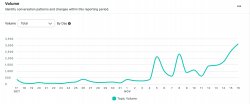Study Finds “Criminal World Cup” Sentiment Against Host Country Qatar
Posted in: School of Communication and Media News

Calls for boycotts on Twitter and human rights activism increase as the tournament begins Sunday
FOR IMMEDIATE RELEASE
November 17, 2022
A team of faculty from the Joetta Di Bella and Fred C. Sautter III Center for Strategic Communication in the School of Communication and Media at Montclair State University released a study today that analyzes social media data and global news surrounding various boycott and protest movements as the FIFA World Cup kicks off this weekend in Qatar.
Highlights from the study show that Qatar’s systematic abuse of labor (reportedly more than 6,500 migrant workers have died while supporting infrastructure and construction for the tournament) and the country’s blatant discrimination against women and LGBTQ+ people have led to online movements to boycott the tournament, some cities to ban public viewing events and teams to activate anti-discrimination campaigns on and away from the pitch.
While the ramifications on TV ratings, sponsor sentiment and a renewed and heightened focus on human rights won’t be fully realized until the tournament begins on Sunday and through its conclusion, the study found the following:
- A sample of 22,000 tweets with the #boycottqatar2022 hashtag were analyzed from October 15 to November 14, 2022, with 18,412,437 potential impressions reaching more than 43 million people. The vast majority (92%) of those tweeting about the boycott demonstrated support of the boycott and human rights activism.
- The following most-tweeted key words and hashtags around the movement were studied: “#boycottqatar2022,” “boycottqatar,” “exploitation,” “construction,” “world cup protest,” “clear message,” “human rights violation,” “6500 + people.”
- Particularly, on Nov. 5 soccer fans in Germany (Borussia Dortmund, Hertha, Bayern, Augsburg, Mainz, etc.) began protesting human rights violations in Qatar. Angered by the numerous injustices in Qatar, fans held huge banners condemning the Gulf state’s exploitative treatment of migrant workers, abuse against LGBTQ+ community, and damages to environment.
- During the studied time period on Twitter, a homophobic comment by Khalid Salman, an ambassador for the World Cup Qatar 2022 and a former Qatari national team player, triggered a second peak of anti-Qatar sentiment.
- The graphic above demonstrates the spike in boycott conversations on Twitter around these events.
- Online activism and calls for boycotting the tournament have affected other aspects of the tournament on and off the pitch. For example:
- The U.S. soccer squad will have the rainbow-themed team logo inside their training facility and media workroom during the World Cup to support the LGBTQ+ community.
- Some major cities in France including Paris, Bordeaux, Strasbourg, Lille and Marseille have decided not to publicly broadcast the World Cup matches on giant screens in fan zones.
- Several European soccer federations (e.g., England, Germany, France, Netherlands) decided to have their captains wear armbands with a rainbow heart design as part of an anti-discrimination campaign.
- Denmark joined the protest by providing a black option for its team jerseys at the World Cup to honor the deaths of migrant workers.
“The decision to award Qatar the World Cup was controversial from the beginning for many reasons, and the online conversations about boycotting the tournament and various forms of protest over the last month validate those concerns,” said Dr. Yi Luo, Associate Professor in the School of Communication and Media at Montclair State University.
The full study, which can be found here, was conducted by faculty Dr. Yi Luo, Dr. Jin-A Choi, Dr. Stephen Andon, Dr. Bond Benton, and Mr. Keith Green from the Joetta Di Bella and Fred C. Sautter III Center for Strategic Communication, which provides social media analytics tools and training for faculty and students for classroom learning and research projects.
The team will also release a separate study on Monday before Team USA’s first game that analyzes social media chatter surrounding favorite teams, players, brands and issues such as online gambling are driving the conversation.
###
About the School of Communication and Media: Founded in 2012, the School of Communication and Media offers a range of dynamic programs in communication and media to a talented and diverse student population of over 1,500. Offering degrees in film and television, social media and public relations, advertising, journalism and digital media, sports communication, animation and visual effects, and an MA in public and organizational relations, the School prepares the next generation of communication and media practitioners and leaders. The School houses award-winning student programs that include WMSC Radio, The Montclarion newspaper, Hawk Communications PR Agency, the Red Hawk Sports Network, Hawk+ OTT streaming platform, and News Lab, as well as the Center for Cooperative Media, which serves the public by working to grow and strengthen local journalism. Recent national School recognitions include an Edward R. Murrow Award, several Marconi Award nominations, and a College Television Award from the Academy of Television Arts & Sciences.
###
Contact: Keith Green, School of Communication and Media, 973-655-3701 or greenk@montclair.edu
